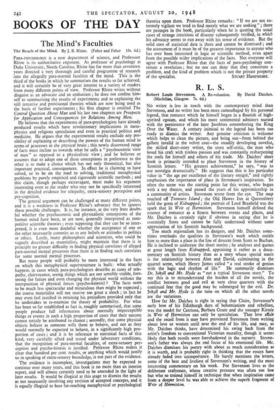BOOKS OF THE DAY
The Mind's Faculties
The Reach of the Mind. By J. B. Rhine. (Faber and Faber 10s. 6d.)
PARA-PSYCHOLOGY is a new department of science, and Professsor Rhine is its authoritative exponent. As professor of psychology at Duke University, North Carolina, Rhine has for more than seventeen years directed a very thorough and careful programme of research into the allegedly ,para-normal faculties of the mind. This is the third of the books in which he summarises the results so far achieved, and it will certainly be of very great interest to a variety of readers from many different points of view. Professor Rhine writes without disguise as an advocate and an enthusiast ; he does not confine him- self to summarising the results of experiments and to explaining the still tentative and provisional theories which are now being used as the basis of further experiments; his first chapter is entitled The Central Question About Man and his last two chapters are Prospects for Application and Consequences for Relations Among Men.
He believes that the experiments of para-psychologists have already produced results which have revolutionary implications in meta- physics and religious speculation and even in practical politics and medicine. He argues that the experimental results exclude any pos- sibility of explaining or describing the powers of the human mind in terms of processes in the physical brain ; this newly discovered range of facts must incline us towards what he calls a " psychocentric view of man" as opposed to a physicalistic view ; and he believes or assumes that to adopt one of these conceptions in preference to the other is to make a choice which has not only theoretical, but also important practical, consequences. In effect he is claiming to have solved, or to be on the road to solving, traditional metaphysical problems by purely empirical and rigorously scientific methods ; and this claim, though perhaps extravagant, must make his argument interesting even to the reader who may not be specifically interested in the detailed evidence for telepathy, extra-sensory perception and pre-cognition. The general argument can be challenged at many different points, and it is a weakness in Professor Rhine's advocacy that he ignores these possible challenges. It is, for instance, at the very least doubt- ful whether the psychocentric and physicalistic conceptions of the human mind have been, or are now, generally interpreted as com- petitive scientific theories ; even supposing that they can he so inter- preted, it is even more doubtful whether the acceptance of one or the other necessarily commits us to any beliefs or attitudes in politics or ethics. Lastly, many philosophers and scientists who could be vaguely described as materialists, might maintain ;hat there is in principle no greater difficulty in finding physical correlates of alleged part-normal mental processes than there is in finding such correlates for some normal Mental processes.
But many people will probably be more interested in the facts on which this metaphysical superstructure is built : what actually happens in cases which para-psychologists describe as cases of tele- pathy, clairvoyance, seeing things which are not sensibly visible, fore- seeing the future and even changing the physical world without the interposition of physical forces (psycho-kinesis) ? The facts seem to be much less spectacular and miraculous than might be expected ; the coarse materialist will not receive too great a shock ; in fact he may even feel justified in retaining his prejudices provided only that he undertakes to re-examine the theory of probability. For what has been so far established as fact is, roughly summarised, that some people produce full information about normally imperceptible things or events in such a high proportion of cases that their success cannot strictly be attributed to chance ; secondly, that some physical objects behave as someone wills them to behave, and not as they would normally be expected to behave, in a significantly high pro- portion of cases ; and it is by reference to statistical facts of this kind, very carefully sifted and tested under laboratory conditions, that the recognition of para-normal faculties, of extra-sensory per- ception and psycho-kinesis is justified. Prbfessor Rhine makes it clear that hundred per cent, results, or anything which would justify us in speaking of extra-sensory knowledge, is not part of the evidence.
The evidence is incomplete, investigations may be expected to continue over many years, and this book is no more than an interim report, and will almost certainly need to be amended in the light of later results. It would be illogical at this stage to dismiss the results as not necessarily involving any revision of accepted concepts and it is equally illogical to base far-reaching metaphysical or psychological
theories upon them. Professor Rhine remarks : "If we are not ex- tremely vigilant we tend to find merely what we are seeking" ; there are passages in the book, particularly when he is quoting the usual cases of strange intuitions of disaster subsequently verified, in which his advocacy seems to run away with his sense of evidence. But the solid core of statistical data is there and cannot be dismissed ; and the assessment of it must be of the greatest importance to anyone who has ever been interested in logic or scientific method, even apart from the possible wider implications of the facts. Not everyone will agree with Professor Rhine that the facts of para-psychology con- stitute a revelation ; but no one can deny that they constitute a problem, and the kind of problem which is not the private property


































 Previous page
Previous page